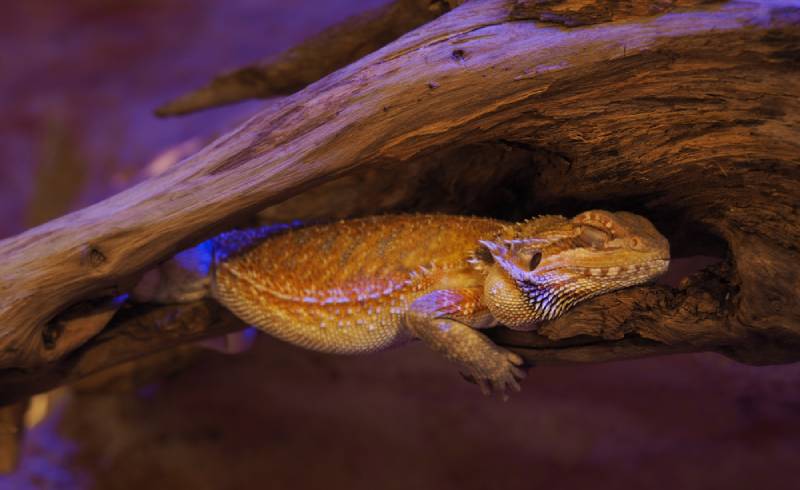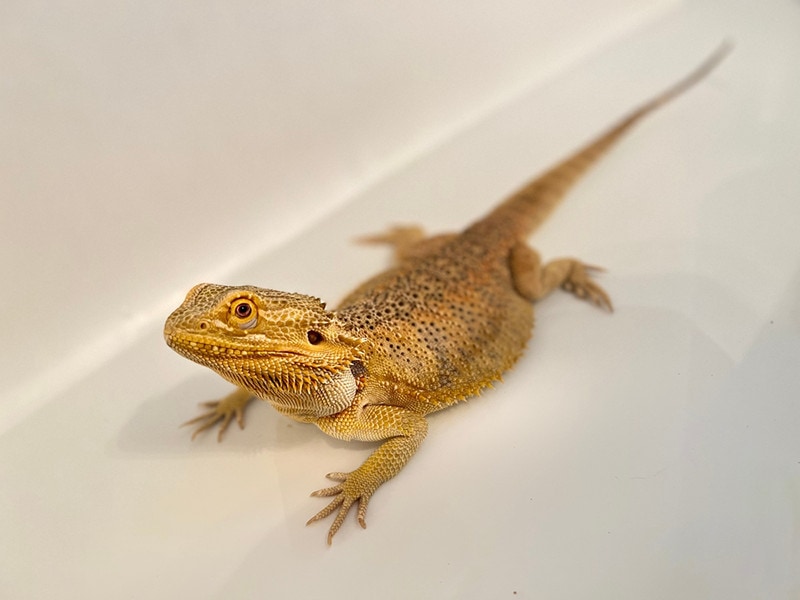Why Does a Bearded Dragon Turn Black? 13 Likely Reasons

Updated on
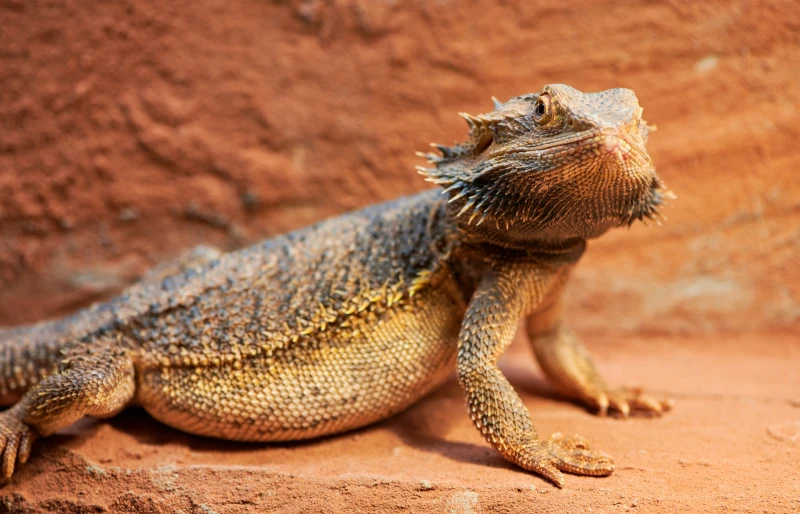
Bearded Dragons are fascinating lizards with a lot of quirks and behaviors that make them interesting housemates. From their head bobbing to periods of brumation, there is a lot to learn about Beardie behavior.
Changes in their appearance and behavior can be an indication of their emotions or health, and one change that you might notice in your Bearded Dragon is it turning black. It may be the beard, the belly, or its back that turns black. A Bearded Dragon turning black may not necessarily be anything to worry about, but it could also be a sign of bad health or stress.
Below, we look at some of the most common causes of this change.
The 13 Reasons Why a Bearded Dragon Turns Black
1. Fear
One of the most common reasons a Bearded Dragon’s beard turns black is that the lizard is scared. Typically, it will puff out its beard and turn it black to make it look more intimidating in a bid to scare off any would-be predator or attacker. Causes of fear can range from you making the Beardie jump to loud barking from the dogs or loud noises from the TV.
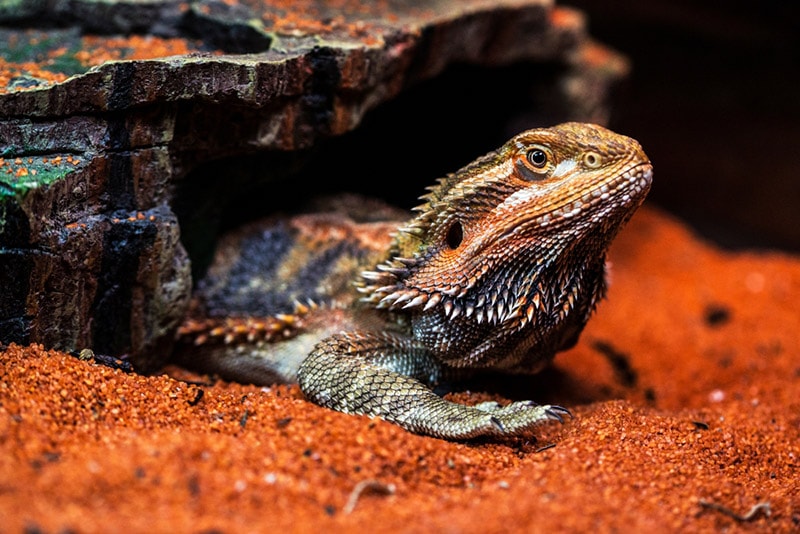
2. Anger
When it’s angry a Bearded Dragon may puff up its beard and the color will darken, in a similar manner to when it is scared. Generally, a Beardie gets angry when it is frustrated. If you’re attempting to pick it up when there’s food in the enclosure, you may see this kind of reaction.
3. Illness
Illness is a possible cause of the beard turning black, although this is less likely than anger, frustration, or fear. The beard turning black is not directly linked to illness, but experts believe that it could either be that the Beardie is anxious and stressed because of the illness, or that it is attempting to look intimidating to warn off attackers at a time when they are defenseless. If your Beardie is showing other symptoms of illness, this could be the cause and you should take them to the veterinarian.
4. Cold
Black objects absorb and retain heat better than lighter-colored objects. Therefore, if your Beardie is cold and struggling to warm up, it may darken its color so that it takes on more heat. It’s a great survival tactic. And if your thermometer says that the temperature is suitable, it may be worth double-checking using a second thermometer.
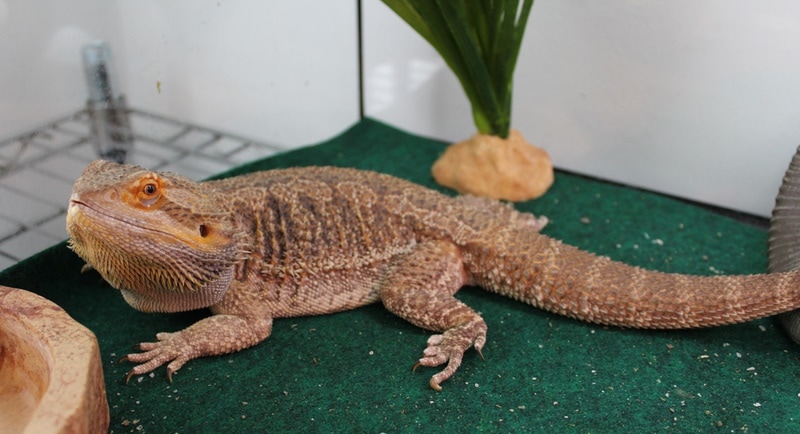
5. Brumation
Brumation is similar to hibernation in some respects. Reptiles brumate when it gets cold, but they still need to drink water. So, rather than hibernating completely, the lizard slows its metabolism and physical activity levels to a near standstill. They will stay in this condition for weeks or months until temperature levels rise again, and they will only emerge when they go looking to take on liquids. Pet Bearded Dragons will not necessarily brumate but many do. And, even more rarely, their beards can turn black when they are coming out of this state.
6. Pooping
This one is difficult to explain but some Bearded Dragons do experience a darkening of their beard when they are getting ready to defecate. This certainly isn’t common and even in those Beardies that do exhibit this habit, it may not occur every time they poop.
7. New Surroundings
Moving to a new enclosure can be difficult for a Bearded Dragon, especially if they were in their old enclosure for a long time. This can cause stress and anxiety: both of which can cause a Bearded Dragon’s beard to darken.
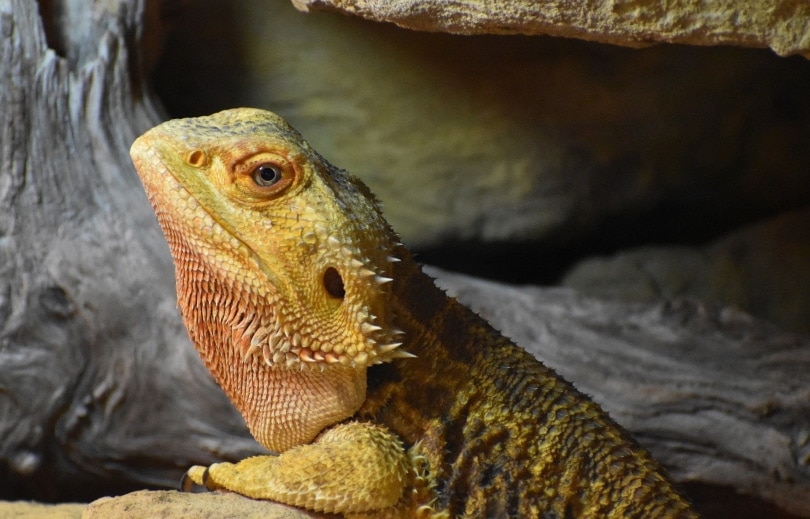
8. Stress
Stress is a common cause of a darkening beard, and there are many possible causes of stress. If your Beardie is stressing about food or knows that there is an insect somewhere in the enclosure but can’t find it or can’t catch it, it can cause stress. The addition of another Beardie to the enclosure can also cause stress. And all of these potential stressors could be the cause of a darkening beard.
9. Attraction
Another possible cause of a darkening beard is that your Beardie is getting ready to mate. Specifically, males turn their beards black as a means of attracting females. This is often accompanied by head bobbing. If you only have one Beardie, or you have multiple Bearded Dragons of the same gender, this isn’t the cause. Also, Bearded Dragons don’t display this activity until they start to sexually mature at about 6 months, so if yours is younger than this, it likely isn’t the cause.
10. Protective
Bearded Dragons can be territorial. This is especially true of male Bearded Dragons around other males. The darkening and puffing of the beard are an attempt to assert dominance and show that they have claimed a particular territory for themselves. If you only have one Bearded Dragon in an enclosure, this isn’t the cause of a darkening beard.
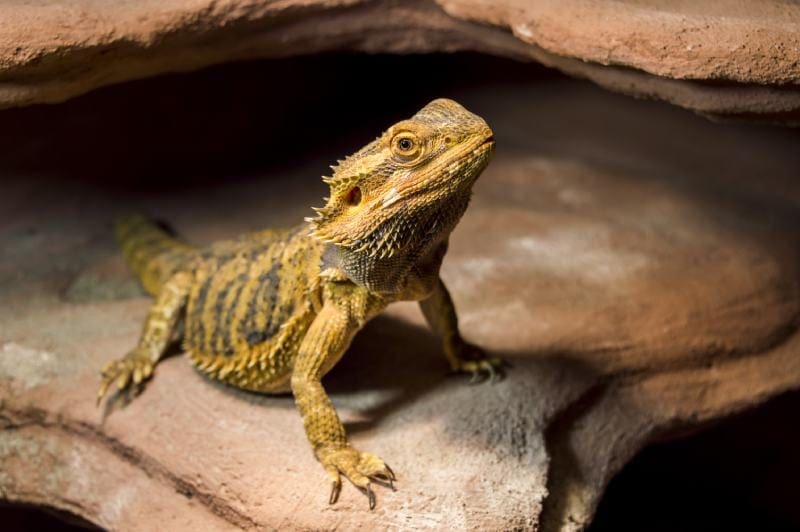
11. Caution
Although they can make great pets and eventually enjoy spending time with their owners, Bearded Dragons can be initially cautious around humans. In the wild, they would have minimal contact with people, and this carries over even in domestic Dragons. If your Beardie isn’t used to you yet, this may be the cause of the color change.
12. Lonely
If your Bearded Dragon is used to companionship, be it from another Bearded Dragon or from you, and it feels it isn’t getting that attention, it could be using the color change as a means of getting the attention it desires. It is a possible sign that you need to spend more time handling your pet.
13. Poor Health
Your Bearded Dragon may not be ill, as such, but if it isn’t in top condition, a black beard could be an indication of this. In particular, this might be caused by poor lighting, heating, or humidity levels, all of which are very important to the general health of the Bearded Dragon. Check these conditions and make improvements. Also, ensure that your Beardie’s enclosure has everything it needs from a basking rock to logs and potentially even a nesting area.
Why Is My Bearded Dragon Puffing Up Its Beard?
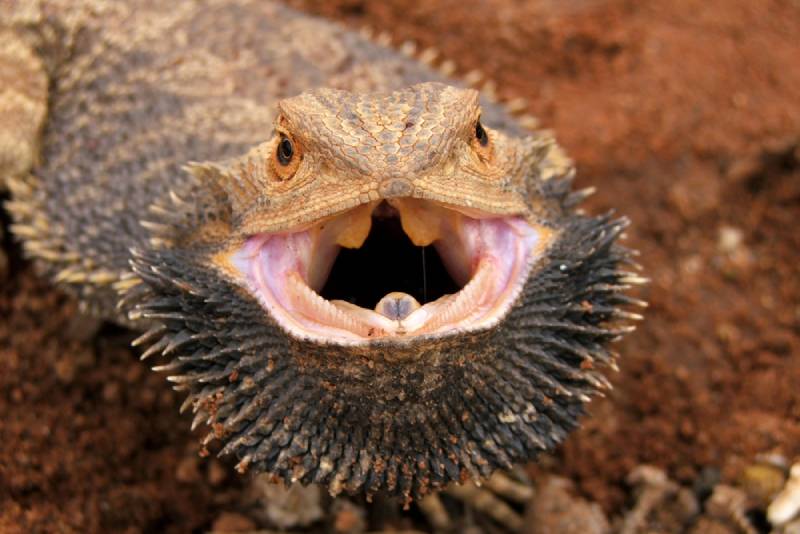
Bearded Dragons generally puff up their beards to look more intimidating. They will do this if they feel threatened, as a precaution if they feel anxious or stressed, and they may also do it as a way to attract a mate. The puffing up of the beard is usually accompanied by the darkening of its color but this isn’t always true.
Why Is My Bearded Dragon Bobbing Its Head?
Head bobbing is another fairly common reaction and has many of the same causes as beard darkening and puffing. This means that your Beardie could be stressed, or anxious, or it could be showing signs of dominance, which can be a problem if you keep a male and female pair together in the same enclosure.
Conclusion
Bearded Dragons really are fascinating animals and not least because of that amazing beard. It can puff up and change color, showing a change in mood or emotion in your Bearded Dragon. Learning what beard changes indicate will come with time for the majority of owners, and the darkening of the beard is most often caused by stress, anxiety, or fear.
Featured Image Credit: C. Nass, Shutterstock

